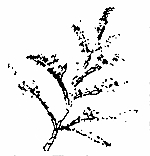 |
Bryzoa is really a pretty small phylum. These animals live in colonies in a U
shaped feeding stucture, always attached to something. The colonies have a ring of
tantacles surrounding the mouth. They eat plankton and bacteria by sweeping the water
around them with their lophophore, while they are mainly eaten by nudibranchs (sea slugs)
and sea spiders. Bryozoans are made up of colonies of individuals, called zooids. If you
look at colonies through a microscope, you can see openings in the geometric patterns they
form. Inside each of those openings that an individual zooid. These Bryozoan colonies can
get very large, containing about two million zooids, nevertheless this would only stretch
about a foot or a little more across. From this you can guess zooids are very small, these
tiny guys are less then one thirty-second on an inch! Make sure however not to mistake
bryozoans for seaweed, be colonize by branching out into shapes that look more like pasta
than living animals. An organism that you may see tidepooling that belongs to
the Bryzoa phylum is Sea Lace. You can find this animal on Irish Moss in lower intertidal
to subtidal zones. The animals get their name because its colonies of numerous calcareous
cells look like lace. Sea Lace forms crusts on algea, pillings and shells. To feed, the
individuals grab tiny organisms which come within reach through the oppening of their
small shells. A Sea Lace related organism called Lacy Crust may also be found on kelps.
|
